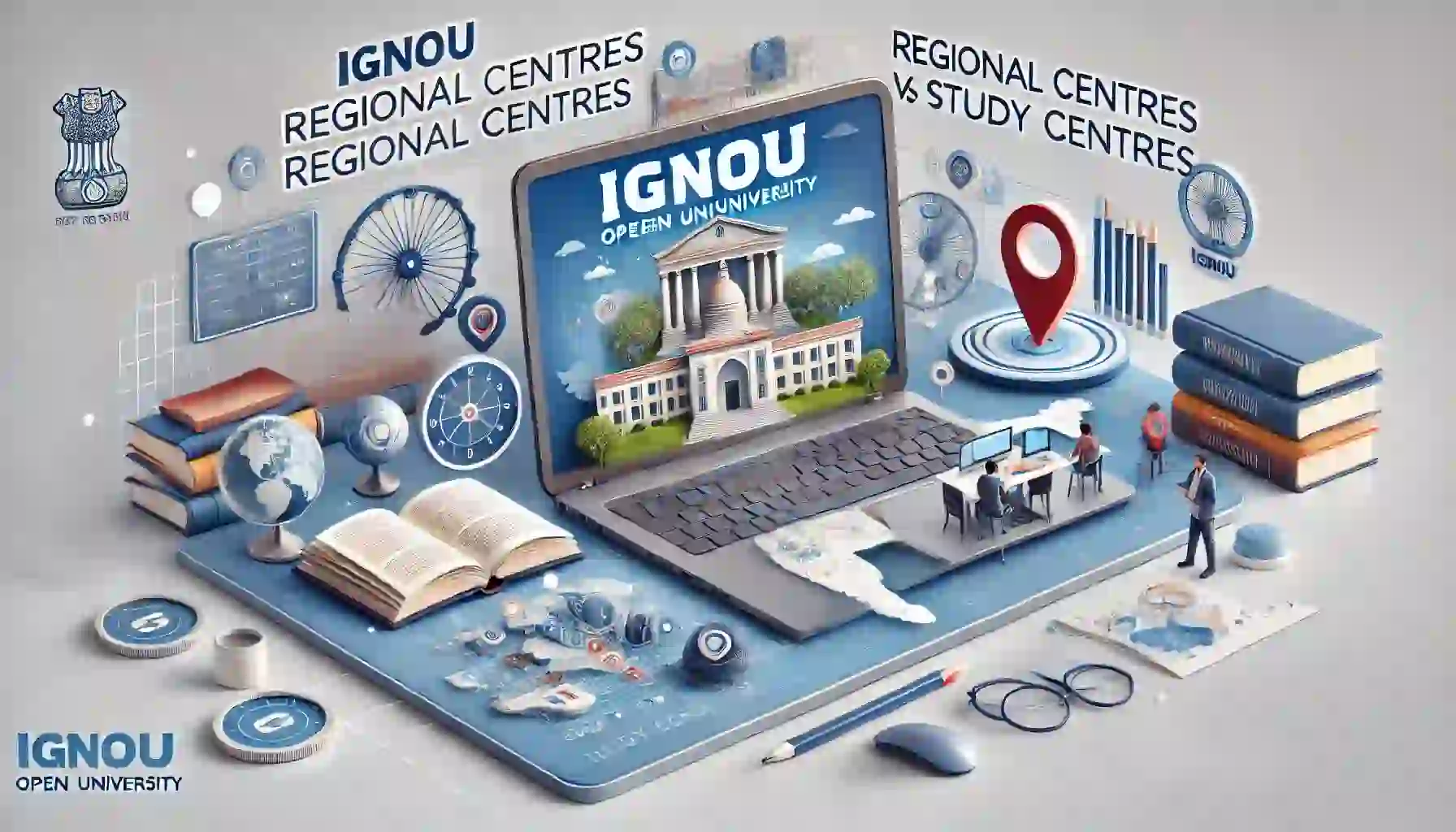Introduction
Brief Overview of IGNOU (Indira Gandhi National Open University)
Indira Gandhi National Open University (IGNOU) is one of the largest distance education institutions in the world, founded in 1985. It offers various academic programs ranging from undergraduate to postgraduate degrees, diplomas, and certificate courses. IGNOU’s primary goal is to provide education to learners across India and globally, using innovative and flexible learning methods.
With a mission to democratize higher education, IGNOU has established itself as a leader in distance learning by offering education to diverse groups of learners, including working professionals, homemakers, and students from remote regions. Through its various modes of delivery, including online, offline, and hybrid learning, IGNOU enables students to pursue their educational goals despite geographical and time constraints.
The Importance of Regional Centres and Study Centres in IGNOU
To meet the needs of students from different corners of the country, IGNOU has established a network of Regional Centres and Study Centres. These centres play a pivotal role in the smooth functioning of the university’s distance learning programs. Both types of centres are essential for student support, offering a variety of services that help bridge the gap between students and the university’s academic resources.
Regional Centres serve as the administrative backbone of the university, while Study Centres provide direct academic support and facilitate learning. Understanding the roles and functions of these centres is key to navigating IGNOU’s vast educational ecosystem.
Purpose of the Article and What You Will Learn
In this article, we will delve deep into the differences between IGNOU Regional Centres and Study Centres. We will explore their definitions, key differences, collaborative roles, the services they provide, and much more. Whether you are a prospective student or an existing learner, this guide will help you make an informed decision about how to engage with IGNOU’s network.
What is IGNOU?
History and Establishment of IGNOU
IGNOU was established in 1985 with the objective of offering high-quality education through distance and open learning modes. The university’s inception marked a significant step toward the inclusion of individuals who could not access traditional education due to various constraints like location, employment, or financial limitations.
As a public institution, IGNOU has continuously expanded its reach, becoming a global leader in distance education. Over the years, it has built a robust system that includes over 21 schools of study and more than 67 Regional Centres spread across India, serving over 3 million students globally.
Key Features of IGNOU’s Distance Learning Programs
IGNOU’s distance learning programs are characterized by flexibility, affordability, and accessibility. Students have the freedom to choose their pace of study, making it an ideal choice for working professionals and individuals with other commitments. Additionally, IGNOU uses a variety of learning materials, including printed study materials, audio-visual resources, and interactive online platforms.
The university offers a range of undergraduate, postgraduate, diploma, and certificate programs in various disciplines, including humanities, social sciences, science, commerce, and management.
IGNOU’s National and International Reach
One of the unique features of IGNOU is its vast network that extends beyond India. The university has made education accessible to students from several countries by establishing international study centres. These global centres make it possible for students abroad to benefit from IGNOU’s programs.
Courses Offered by IGNOU: An Overview
IGNOU offers a broad spectrum of academic programs across various disciplines. The courses include certificates, diplomas, undergraduate, postgraduate degrees, and doctoral programs. Some of the popular courses include:
- Bachelor’s Degree: Bachelors in Arts (BA), Commerce (BCom), Science (BSc), and Computer Applications (BCA).
- Master’s Degree: MA in English, History, Political Science, and MBA in various specializations.
- Diplomas and Certificates: Courses in IT, Education, Management, and Environmental Studies.
- PhD and MPhil: Programs in various subjects like Sociology, Education, and Management.
What is an IGNOU Regional Centre?
Definition and Role of Regional Centres
An IGNOU Regional Centre is the primary administrative and academic unit of the university in a specific geographic area. These centres serve as the operational hubs that oversee the implementation of various academic programs. Each Regional Centre is responsible for coordinating the academic activities in its region, including student enrollment, assignment submissions, examination management, and providing academic support to Study Centres.
Importance of Regional Centres in IGNOU’s Network
Regional Centres are crucial in ensuring the smooth functioning of the university. They act as bridges between the university’s headquarters and the Study Centres. They are responsible for implementing policies and instructions from the central administration and ensuring that they are adhered to at the local level.
These centres also play a key role in handling student grievances, ensuring that learners receive proper support throughout their academic journey.
Services Provided by IGNOU Regional Centres
Regional Centres offer a wide range of services, such as:
- Student Enrollment: Facilitating the admission process and ensuring that students are enrolled in the right programs.
- Academic Support: Providing guidance on courses, study materials, and academic counseling.
- Examination Management: Coordinating exam schedules, centers, and result dissemination.
- Regional Networking: Communicating with Study Centres to align operations and ensure students receive timely information.
How Regional Centres Facilitate Student Support
The Regional Centres play a critical role in ensuring students have access to the necessary support. This includes personalized guidance for students facing challenges in completing assignments or understanding coursework. They also address queries related to exams, schedules, and policies.
Locations of IGNOU Regional Centres
IGNOU operates over 67 Regional Centres in different parts of India, including remote areas, to ensure that education is accessible to all. The centres are strategically located in urban and rural regions to cater to students from diverse backgrounds.
What is an IGNOU Study Centre?
Definition and Function of Study Centres
A Study Centre is a local academic unit that provides direct academic support to students enrolled in IGNOU programs. Unlike Regional Centres, Study Centres focus on student learning and academic development. They are responsible for providing tutorial support, conducting workshops, and acting as points of contact for students in specific geographic areas.
How Study Centres Differ from Regional Centres
While Regional Centres are the administrative arm of the university, Study Centres are primarily focused on academic delivery. Regional Centres manage the logistics and policy enforcement, while Study Centres are where students interact with their courses, meet faculty members, and attend workshops or counseling sessions.
Services and Facilities Provided by Study Centres
Study Centres offer several services, including:
- Tutorials and Workshops: Students receive help with understanding course materials, assignments, and exam preparation.
- Assignment Submission: Centers collect assignments and ensure they are submitted on time.
- Counseling Sessions: Students can interact with academic counselors who guide them throughout their studies.
- Examination Centers: Many Study Centres also function as exam centers for local students.
Role of Study Centres in the Learning Process
Study Centres play a pivotal role in delivering the face-to-face aspect of distance learning. They provide students with an opportunity to interact with instructors and peers, allowing for a more personalized and interactive learning experience.
Locations of Study Centres and Their Distribution
Study Centres are located in almost every district of India, ensuring that even students from the most remote areas have access to them. The location of Study Centres is mapped out to ensure that they cater to the specific needs of the student population in their respective regions.
Key Differences Between Regional Centres and Study Centres
Hierarchical Structure: Regional Centres vs Study Centres
The relationship between Regional Centres and Study Centres can be seen as hierarchical, with Regional Centres overseeing the administration and overall functioning of multiple Study Centres in their designated regions. While the Regional Centres are responsible for ensuring that operations are in line with the university’s standards, the Study Centres focus on delivering educational services and supporting students directly.
Administrative and Academic Functions
The Regional Centres handle administrative functions, such as student registration, coordination of exams, and communication with the central university. In contrast, Study Centres primarily focus on academic functions like delivering tutorials, providing academic counseling, and conducting examinations.
Physical Infrastructure and Resources
Regional Centres tend to have more substantial physical infrastructure, including larger office spaces, conference rooms, and resources for administrative functions. Study Centres, on the other hand, are typically smaller and are equipped with facilities such as classrooms, study halls, and libraries tailored to support the academic needs of students.
Student Support and Assistance
Both centres provide student support, but Regional Centres are more focused on administrative support, while Study Centres offer direct academic assistance.
Local and Regional Impact of Centres
Regional Centres manage a wider geographical area, influencing a large number of Study Centres, while Study Centres impact students directly by providing localized services and ensuring that learning remains effective at the ground level.
How Regional Centres and Study Centres Work Together
Collaborative Efforts for Academic Success
Both types of centres play complementary roles in a student’s educational journey. Regional Centres provide oversight and ensure the smooth running of the programs, while Study Centres focus on providing the necessary academic support.
The Role of Regional Centres in Managing Study Centres
Regional Centres are responsible for training the staff at Study Centres, ensuring consistency in the quality of education and services. They also communicate any changes in policies or procedures to the Study Centres.
How Study Centres Function Under Regional Centres
Study Centres operate according to the guidelines and frameworks set by the Regional Centres. This coordination ensures that students across different regions receive similar support and have access to uniform academic resources.
Example of Cooperation Between Centres
A practical example of cooperation is the annual review process where Regional Centres evaluate the performance of Study Centres based on student feedback, academic progress, and operational efficiency.
Student Enrollment and Interaction with Centres
How Students Are Assigned to Regional and Study Centres
When students enroll in an IGNOU program, they are assigned to a Regional Centre based on their geographical location. The Regional Centre then assigns students to the nearest available Study Centre. This system ensures that students have easy access to the support they need throughout their studies, whether it is administrative or academic.
Enrollment Process and Procedures
The enrollment process in IGNOU is simple and can be done either online or offline. Students can register for their desired programs through the IGNOU website or at the nearest Regional Centre. Once enrolled, students receive information about their assigned Study Centre, where they can participate in face-to-face tutorials, workshops, and other academic activities.
The entire process is designed to be flexible and accessible, providing a seamless experience for students regardless of their location.
How Regional Centres Help in Course Registration and Student Queries
Regional Centres play a crucial role in assisting students with their course registration. They ensure that students select the right program and meet the necessary prerequisites. Additionally, students can contact their Regional Centre for assistance with any academic or administrative queries, such as issues related to their enrollment status or study materials.
Direct Interaction with Study Centres for Academic Guidance
Once students are assigned to a Study Centre, they can directly interact with academic counselors and faculty members to resolve any questions regarding course content, assignments, or exams. Study Centres serve as the hub for face-to-face learning, offering a more personalized experience compared to online-only education.
Understanding the Role of Faculty at Regional Centres vs Study Centres
Faculty Management and Administration at Regional Centres
Faculty members at Regional Centres are responsible for overseeing the broader academic framework within their region. They help in the development of curricula and ensure that the academic programs are consistent with the university’s standards. Faculty at Regional Centres also manage the administrative duties related to examinations, grading, and academic counseling.
Faculty Interaction at Study Centres: Academic Mentorship and Support
At Study Centres, faculty members provide direct academic guidance to students. They are responsible for conducting tutorials, reviewing assignments, and offering personalized support to students struggling with course material. Faculty at Study Centres act as mentors, helping students navigate the challenges of distance learning.
The Distinction in Faculty Responsibilities at Both Centres
The primary distinction lies in the scope of faculty responsibilities. Faculty at Regional Centres are more focused on the overarching academic administration and coordination of multiple Study Centres, while faculty at Study Centres are engaged in direct teaching and student support.
Infrastructure and Facilities Available at Regional Centres
Educational Tools and Resources
Regional Centres are equipped with extensive resources for academic and administrative functions. These include computer labs, online portals for virtual learning, and physical libraries for students and faculty. They often organize workshops and seminars to provide students with additional resources and opportunities for academic development.
Campus and Online Infrastructure
Regional Centres tend to have a larger campus setup, including classrooms, conference halls, and administrative offices. They also provide online platforms for students to access study materials, assignments, and exam results. The aim is to ensure that students have access to both traditional and digital learning tools to enhance their academic experience.
Workshops, Seminars, and Other Learning Opportunities
To foster continuous learning, Regional Centres regularly organize workshops, seminars, and guest lectures. These events give students the opportunity to engage with industry experts and academicians, further enriching their educational experience.
Library and Research Facilities at Regional Centres
IGNOU’s Regional Centres often have well-stocked libraries with access to various academic books, journals, and research papers. These libraries support students in their studies and research, providing a wealth of resources in multiple formats.
Facilities and Services at Study Centres
Classrooms and Learning Spaces
Study Centres offer classrooms and learning spaces where students can attend face-to-face tutorials and workshops. These spaces are designed to foster interaction between students and faculty, providing an environment conducive to learning.
Study Materials, Books, and E-Learning Support
At Study Centres, students receive the study materials prescribed by IGNOU. These materials are updated regularly to keep up with the latest academic advancements. Additionally, many Study Centres provide e-learning resources like online lectures, digital books, and video tutorials to complement the physical study materials.
Exam Centers and Test Preparation Resources
Many Study Centres double as exam centres where students can sit for their term-end examinations. These centres offer dedicated support to ensure that students are well-prepared for exams through mock tests, practice sessions, and tips from faculty members.
Student Welfare Services at Study Centres
Study Centres are also equipped to support students’ well-being, offering counseling services for academic stress and personal challenges. This holistic approach helps ensure that students are not just learning but also developing the necessary skills to succeed in their professional lives.
Regional Centres vs Study Centres: Which is More Beneficial for Students?
Academic Support and Guidance from Regional Centres
Regional Centres play a crucial role in providing overall academic guidance and support. They are responsible for ensuring that the educational programs are consistent, standardized, and up-to-date. However, students may not have direct academic interaction with Regional Centres as they would at Study Centres.
Flexibility and Accessibility of Study Centres for Students
Study Centres are more accessible for students seeking direct interaction with faculty members and fellow learners. The face-to-face support provided at Study Centres allows students to engage more effectively with the material, ask questions, and attend sessions that aid in their learning.
Choosing the Right Centre for Your Learning Needs
The choice between Regional Centres and Study Centres depends largely on the type of support students require. If administrative assistance and program guidance are the priority, Regional Centres are more beneficial. On the other hand, for academic guidance and peer interactions, Study Centres provide a more focused learning environment.
Considerations Based on Geography and Course Type
The decision to engage with either a Regional Centre or a Study Centre might also depend on the student’s geographical location and course type. For example, students in remote areas might find it more convenient to interact with Study Centres for personalized academic help, while students pursuing specific degrees might benefit more from the regional coordination provided by the Regional Centres.
Challenges Faced by Students in Regional and Study Centres
Common Obstacles in Accessing Regional Centres
Students often face challenges when accessing Regional Centres, such as long distances, administrative delays, and insufficient support for specific issues. These challenges can make it difficult for students to get quick resolutions for their queries and concerns.
Issues Faced at Study Centres (Location, Resources, etc.)
While Study Centres are crucial for learning, some students might encounter problems such as inadequate learning materials, poor infrastructure, or limited faculty support. In some cases, geographical factors might prevent students from accessing the nearest Study Centre, leading to delays or missed opportunities for academic support.
How IGNOU is Addressing These Challenges
IGNOU has made significant strides to address these challenges by enhancing online learning tools, improving infrastructure at both Regional and Study Centres, and streamlining administrative processes. The university has also implemented mobile apps and online platforms that enable students to access information and support remotely.
Strategies for Overcoming Barriers to Education
IGNOU continues to focus on providing equitable education by expanding its network of Study Centres, increasing the availability of online resources, and offering more flexible learning options for students who face logistical or academic challenges.
Future Developments: What Lies Ahead for IGNOU Regional and Study Centres in 2025?
Technological Advancements and Their Impact on Centres
The future of education lies in technology, and IGNOU is focusing on integrating more digital tools into its educational framework. This includes expanding its e-learning platforms, incorporating virtual classrooms, and offering more hybrid learning options. These advancements will make it easier for students to access learning materials and academic support.
Expansion Plans and New Regional Centres
In the coming years, IGNOU plans to expand its presence by opening new Regional Centres in underserved areas, especially in remote or rural regions. This will allow more students to access high-quality education without facing geographical constraints.
New Policies and Initiatives to Improve Student Services
IGNOU is working on improving the student experience by introducing new initiatives aimed at enhancing academic counseling, providing better digital resources, and increasing collaboration between Regional Centres and Study Centres.
What Students Can Expect from IGNOU in the Future
Students can expect a more streamlined, flexible, and tech-savvy learning experience in the years ahead. With continued focus on student-centric innovations, IGNOU will continue to meet the needs of diverse learners in India and abroad.
Conclusion
Recap of Key Points
In this article, we’ve explored the crucial roles of IGNOU’s Regional Centres and Study Centres. We have looked at their functions, differences, and how they work together to provide a comprehensive learning experience for students. Both centres are integral parts of the IGNOU system, with Regional Centres handling administration and coordination, while Study Centres focus on direct academic support.
Final Thoughts on the Importance of Regional and Study Centres
Both types of centres are vital for students’ academic success. Regional Centres ensure smooth administration and oversight, while Study Centres offer hands-on support and guidance. Together, they create a robust educational environment that ensures students can access the resources they need to succeed.
How IGNOU’s Infrastructure Supports Distance Learning in 2025
As IGNOU continues to evolve, its network of Regional and Study Centres will play an essential role in providing an accessible and effective learning experience for students across the globe. With new technological advancements and increased access to resources, the future of distance education looks brighter than ever.
FAQs
What is the difference between an IGNOU Regional Centre and a Study Centre?
An IGNOU Regional Centre is an administrative unit responsible for overseeing the operations of multiple Study Centres within a specific region. It handles enrollment, student queries, and coordinates academic activities across its designated area. A Study Centre, on the other hand, focuses on providing academic support, including tutorials, workshops, and exam facilities. Study Centres act as direct points of contact for students, where they can receive face-to-face guidance and resources.
How can I find my assigned IGNOU Regional or Study Centre?
Once you enroll in an IGNOU program, you will be assigned to a Regional Centre based on your location. The Regional Centre will then assign you to a nearby Study Centre for academic support. You can find your assigned centres through the IGNOU student portal, or by contacting your Regional Centre for more specific information.
Can I change my IGNOU Regional or Study Centre if needed?
Yes, it is possible to request a transfer of your Regional or Study Centre, though certain conditions may apply. Typically, students can request a change due to reasons like relocation, health issues, or unavailability of specific courses. To request a transfer, you must contact your Regional Centre and provide relevant documentation. The transfer process may take time, and approval depends on the availability of a suitable centre in the new location.
Related Posts:




